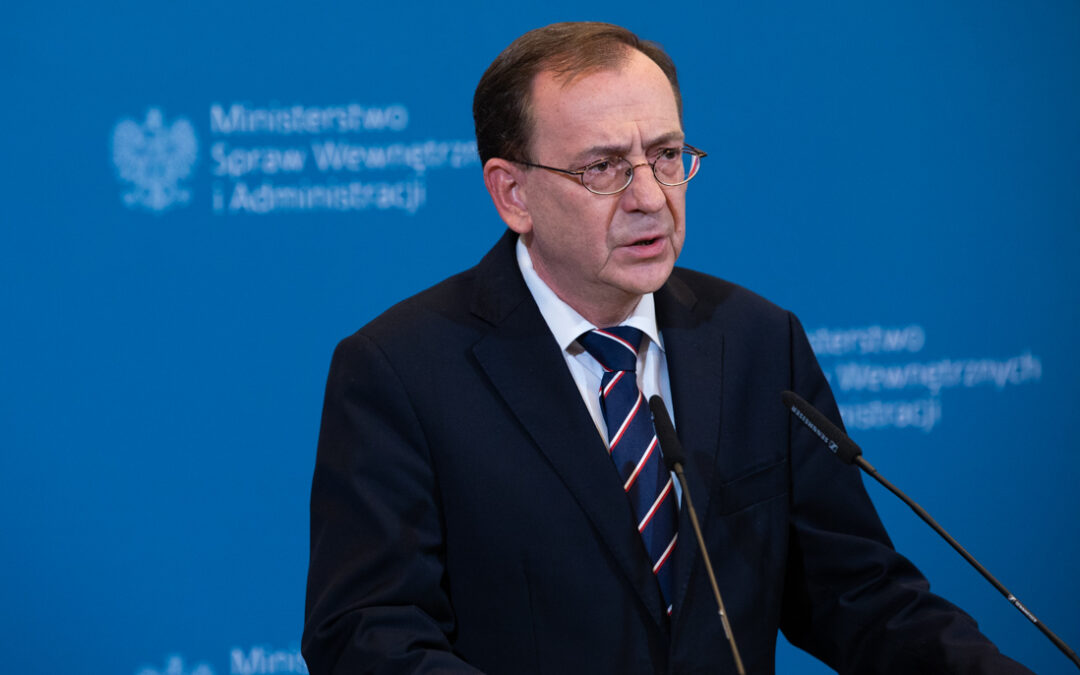A Polish opposition politician and former minister who was convicted in December for abuse of power has filed a case against Poland at the European Court of Human Rights (ECHR). He claims he was tortured during the two weeks he spent in jail in January before being pardoned by the president.
Mariusz Kamiński, who was last month elected as a member of the European Parliament for the national-conservative Law and Justice (PiS) party, argues that prison authorities used physical violence against him by restraining him and force-feeding him through a tube during his hunger strike.
Europejski Trybunał Praw Człowieka przyjął skargę w sprawie zastosowania wobec mnie tortur podczas bezprawnego przetrzymywania w więzieniu.
To szokujące, że w państwie, które jest członkiem Unii Europejskiej, wobec przedstawicieli opozycji stosuje się takie metody.
Nie ma… pic.twitter.com/Hd4eKgNbgc
— Mariusz Kamiński (@Kaminski_M_) July 17, 2024
Kamiński and his former deputy minister, Maciej Wąski, were in December handed jail sentences at the end of a long-running legal case relating to their actions when leading the Central Anticorruption Bureau (CBA).
In early January, the pair were detained by police at the presidential palace and taken to jail, where they spent two weeks before being pardoned by Duda. Both launched a hunger strike while in jail. A day before Duda issued his pardon, Kamiński was hospitalised due to his deteriorating condition.
Following his release, Kamiński claimed that that he had been tortured in prison by being force-fed through a nasal tube. PiS chairman Jarosław Kaczyński repeated those claims during a speech in which he likened Prime Minister Donald Tusk to Hitler.
Sorry to interrupt your reading. The article continues below.

Notes from Poland is run by a small editorial team and published by an independent, non-profit foundation that is funded through donations from our readers. We cannot do what we do without your support.
Speaking in Strasbourg today, Kamiński announced that he has “filed a complaint…with the European Court of Human Rights regarding the use of torture against me as a representative of the democratic opposition in our country”. This related to “the methods the prison administration used against me”.
He claimed that he had been subjected to “physical violence”, was immobilised with belts on several occasions, and, that despite medical contraindications, half-metre-long tubes were pushed through his nose to feed him.
“It is shocking that in the 21st century, in a country that is a member of the democratic [European] Union, it can be said that torture is used against opposition representatives,” said Kamiński.
“Unfortunately, it needs to be said out loud that the current Tusk government is not only using lawless violations against the political opposition, but it is also using methods that inflict physical pain, physical suffering on imprisoned representatives of the democratic opposition.”
Poland's interior minister has rejected claims that a priest detained over alleged corruption involving the previous government was tortured in prison.
But the opposition has called on the UN's Committee against Torture and @amnesty to investigate https://t.co/fymX0XJRcJ
— Notes from Poland 🇵🇱 (@notesfrompoland) July 4, 2024
Kamiński also claimed to have a letter from Poland’s human rights commissioner stating that there was no justification for the forced feeding in prison.
However, on 18 January, five days before Kamiński’s release, the office of the human rights commissioner issued a report after visiting the prison in which it said that Kamiński was being held in “good conditions” and noted that a court had issued approval for him to be force-fed.
Separately, both Kamiński and Wąsik have argued that their convictions in December were handed down in violation of the law, as they had been previously pardoned by President Andrzej Duda, a PiS ally, in 2015.
In June last year, the Supreme Court ruled that the 2015 pardons were themselves invalid because they were issued while Kamiński and Wąsik were still appealing against their convictions. However, the Constitutional Tribunal separately ruled that the Supreme Court had no right to issue such a ruling.
Two opposition politicians have been charged by prosecutors for participating in parliamentary activities despite being banned from public office after receiving convictions.
The pair claim they are victims of "political repression" by the government https://t.co/UHG0Z474MS
— Notes from Poland 🇵🇱 (@notesfrompoland) April 18, 2024
Main image credit: MSWiA (under CC BY-NC-ND 3.0 PL)

Alicja Ptak is deputy editor-in-chief of Notes from Poland and a multimedia journalist. She has written for Clean Energy Wire and The Times, and she hosts her own podcast, The Warsaw Wire, on Poland’s economy and energy sector. She previously worked for Reuters.



















